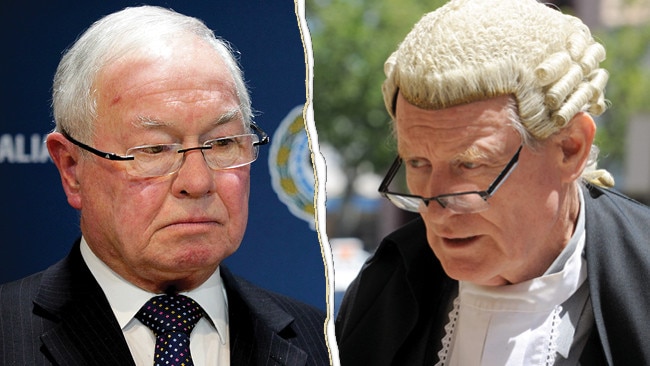Michael Abbott QC launches attack on SA ICAC during parliamentary inquiry, calls it an ‘abuse of power’
ONE of South Australia’s most prominent lawyers, Michael Abbott QC, has launched an astonishing broadside at corruption watchdog Bruce Lander under the protection of parliamentary privilege.
- Open ICAC hearings coming to State Parliament
- ICAC Commissioner eviscerates Leesa Vlahos in Oakden report
- Gillman land deal: ICAC report handed down
- Lawyers concerned with ICAC changes
SOUTH Australia’s corruption watchdog Bruce Lander presides over a “Star Chamber” and conducts “nothing less than a trial by ambush”, one of the state’s most respected lawyers has told a Parliamentary committee.
Michael Abbott QC told the Crime and Public Integrity committee that Independent Commissioner Against Corruption Bruce Lander had the “power to make his own rules” about how his investigations were conducted.
Mr Abbott, who has represented former ministers Tom Koutsantonis and Leesa Vlahos in ICAC hearings into the Gillman land sale and the Oakden nursing home scandal, said Mr Lander’s power had been “abused” in his experiences during hearings.

He used parliamentary privilege to provide his account of what “life in the coal face is like when you deal with ICAC” as the committee prepares a report on whether Mr Lander should be able to hold misconduct and maladministration hearings in public.
An ICAC spokeswoman said Mr Lander would not respond until he had viewed a full transcript of Mr Abbott’s evidence.
Mr Lander will appear before the committee next Wednesday.
“He has the sole right to call in who he likes but if it doesn’t fit in with his agenda and his view and what he’s going to find, he doesn’t do it,” Mr Abbott said.
“This inquisition process that he conducts is a trial by ambush and nothing less than a trial by ambush.
“ … You’re entitled to know what his views are — with a view to changing them. It’s an added protection you get in a Star Chamber such as the ICAC hearing,” Mr Abbott said.
The term Star Chamber references an all-powerful English court that began in the mid-15th century and enforced the laws on prominent people lower courts may not have.
“In one sense, one could see in the pillars of public duty that this is a pretty good way of operating, but the issue is, is that fair?” Mr Abbott said.
“And you have to balance considerations of what is fair with giving the man unlimited power which is what he’s seeking.
“If you give great power it’s capable of being abused … and in some cases I have unfortunately been on the end of, power is abused and that’s why I’m here.”
Mr Abbott said people appearing before the ICAC should have the right to a lawyer at all stages, to know what allegations had been made about them, and should have the “right to silence and the right to face your accuser”.
He expressed concern that the open-hearings legislation would allow Mr Lander to hold an open hearing after a series of closed hearings.
“That’s in effect a trial by ambush because you roll up and you don’t know what you’re going to be meeting. He’ll tell you he’s investigating transaction X or account Y but that’s all you know,” he said.
“So there needs to be a safeguard built into the Act that requires him to make full disclosure.”
Mr Abbott said he should also table a preliminary report of his views, as he did during the Gillman inquiry. Mr Lander’s final report was substantially different to the interim report.
“You’re entitled to know what his views are to be able to challenge them,” he said.
Mr Abbott also said his attempts to write his own account of what occurred during the Oakden inquiry was rejected by Mr Lander’s “minion”, ICAC legal services director Rod Jensen.
He also said Mr Lander had “threatened” to refer him to the Legal Profession Conduct Commissioner, but had yet to do so.
“I welcomed that but he hasn’t bothered to do that, so I’m still waiting,” he said.
